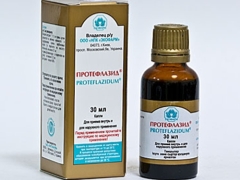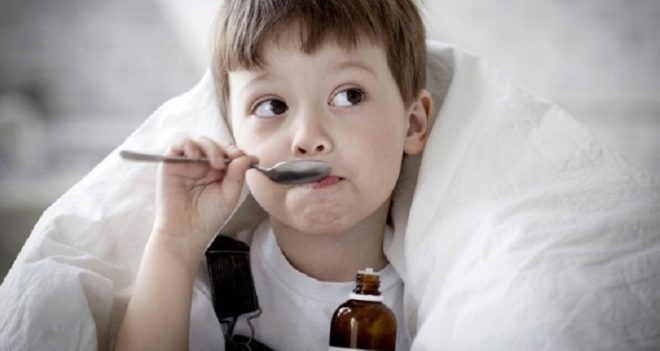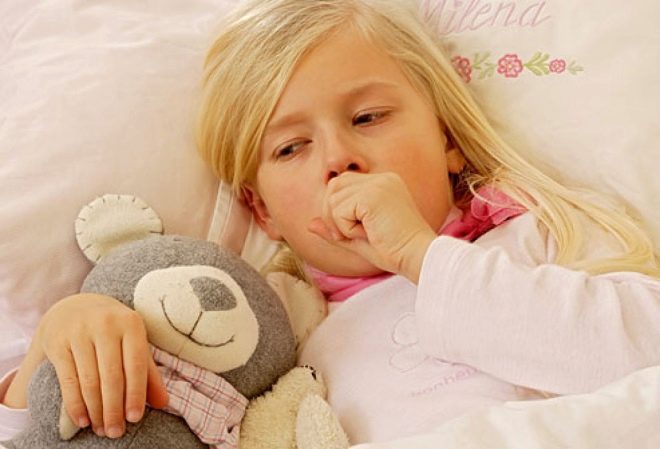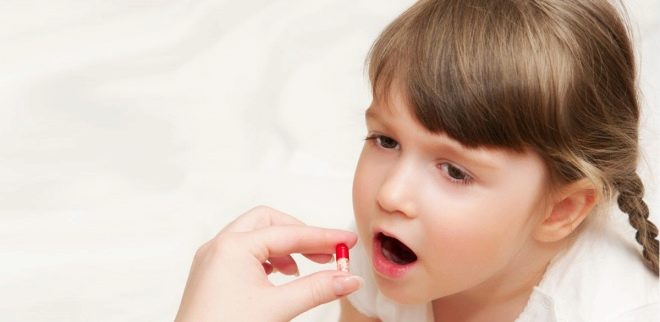Proteflazid for children: instructions for use
For the treatment of diseases that are caused by viruses, special preparations are used that can affect such pathogens. These include and Proteflazid - antiviral drug with a natural basis. Is it possible to give this medicine to children and how to use it properly in childhood?
Release form and composition
Proteflazid is a solution that has a dark green color and a specific aroma. It is sold in bottles equipped with droppers. One such glass bottle of dark color can hold 25, 30 or 50 ml of medication. During storage, the solution often becomes gelled, but returns to a liquid state after shaking.
The active substances of the medicament are two wild cereal plants - turf meadow (it is also called pike) and ground reed.
In 100 ml of solution such herbs are contained in an amount of 50 grams each and supplemented with only 96% ethyl alcohol. There are no other auxiliary ingredients in this medicine.
Operating principle
Flavonoid glycosides, which are part of Proteflazid, have an antiviral effect. They are able to affect enzymes (among them DNA and RNA polymerases, as well as thymidine kinase and neuraminidase) in virus-infected cells. Because of this, viral protein reproduction is impaired, reproduction of viral particles is stopped or slowed down.
Studies have shown the activity of Proteflazid against influenza viruses, herpes, SARS, hepatitis and many other infections. In addition, under the action of Proteflazid, the production of interferon gamma and alpha is activated, making nonspecific immunity to bacterial and viral infections strengthened. In addition, the use of the solution normalizes the amount of lysozyme, immunoglobulin A, lactoferrin and other indicators of local immune protection.
Indications
The reason for using Proteflazid can be both treatment and prevention of various viral infections. This medicine is prescribed:
- with the defeat of herpes simplex viruses mucous membranes and skin;
- with chickenpox or herpes zoster;
- with cytomegalovirus infection;
- when infected with Epstein-Barr viruses;
- with flu, viral rhinitis and other acute respiratory viral infections.
In addition, the drug may be included in the complex treatment of viral hepatitis, HIV infection, human papillomavirus infection and other diseases.
From what age is prescribed?
Proteflazid is considered a safe for children drug, so it is used from birth.
Contraindications
The drug is not prescribed in case of hypersensitivity to its components. In addition, Proteflazid should not be taken for ulcerative lesions of the stomach or duodenum.
Side effects
The use of Proteflazid may be accompanied by headache, general weakness, and the appearance of an allergic reaction. In some patients, a temporary fever may occur for 3–10 days of treatment.
If the body temperature rises no higher than +38 degrees, it is not necessary to cancel the medication. At a higher rate, it is recommended to consult a doctor.
When using the medication locally, uncomfortable symptoms such as dryness, burning or itching may occur.In such a situation, applications with a less concentrated solution should be made.
Instructions for use
Before each use, Proteflazid vial should be shaken. You can use the solution both inside and out. If the medication is given to a child to be swallowed, then it is dropped into the water, on a small amount of sugar or starch. For accurate dosing use dropper on the lid of the bottle.
The regimen varies according to age. For children under one year, Proteflazid is given 1 drop once a day. For children 1-2 years old, a single dose will also be 1 drop, but the medication should be given twice.
Older children are prescribed the drug twice in such a single dosage:
- for a child 2-4 years old - 2 drops;
- for a child 4-6 years old - 4 drops;
- for a patient 6-9 years old - 9 drops each;
- for children of 9-12 years old - 10 drops each;
- for teenagers older than 12 years old - 12-15 drops each.
The duration of treatment with Proteflazid is affected by the indications and the course of the disease. For example, with chickenpox or herpetic stomatitis, drops are taken for 1 month, and for those affected by cytomegalovirus or Epstein-Barr viruses, the medication is prescribed for 3 months.
If a child has an acute respiratory viral infection or flu, the medication is prescribed for 5-14 days, and for the prevention of such diseases, the remedy is given to the child for 2-4 weeks in a reduced dose.
Local use of Proteflazida is in demand with the herpes viruses and papillomatosis. The medicine smears infected areas up to 5 times a day. For one application, take 36-38 drops and mix with 10 ml of saline. Lotion hold up to 10-15 minutes. Such treatment is prescribed for a period of at least 10 days and continue until all the symptoms of lesions of the mucous membrane or skin disappear.
Overdose and drug interactions
The manufacturer does not report cases of overdose of the solution, but notes that a large dose of Proteflazid may cause side effects from the gastrointestinal tract.
The drug is compatible with antifungal or antibacterial agents, therefore, it can be administered with such drugs when a viral infection is combined with infection with bacteria or fungi.
Terms of sale and storage
The drug is sold by prescription and costs 1500-2000 rubles per bottle of 30 ml. The shelf life of the solution - 3 years. While it has not expired, the medicine is stored at room temperature out of the reach of small children.
Reviews
Proteflazid receives a lot of positive reviews, in which it is called a very effective antiviral agent that strengthens the immune system and accelerates recovery. The main disadvantage of the solution is its high price. Also, there are complaints of unpleasant taste or lack of therapeutic effect.
Analogs
Instead of Proteflazid, other drugs acting on viruses can be used, for example, Arbidol, Groprinosin, Ingavirin, Orvirem, Kagocel or Amiksin. They are in demand for influenza, chickenpox, herpetic sore throat and other viral diseases, but should be used in children only as directed by a doctor.
Doctors, among whom Dr. Komarovsky, insist that the treatment of a child with any antiviral medication without a specialist’s control is unacceptable. Giving Proteflazid or any of its analogues to children alone is not allowed.
Dr. Komarovsky will tell all about antiviral drugs for children in the next video.
























